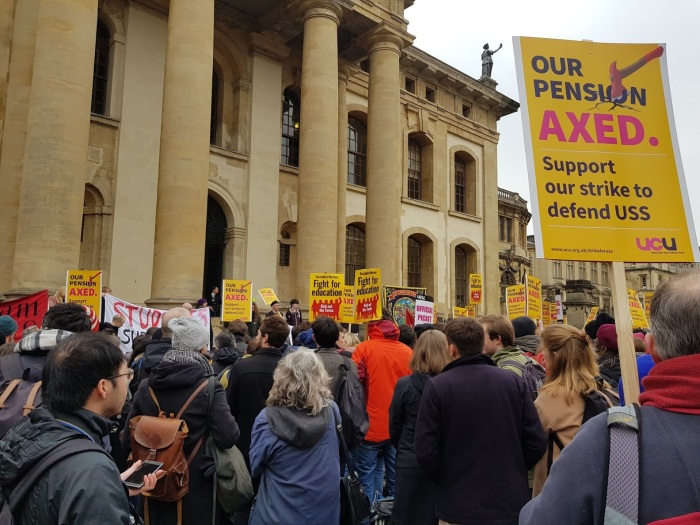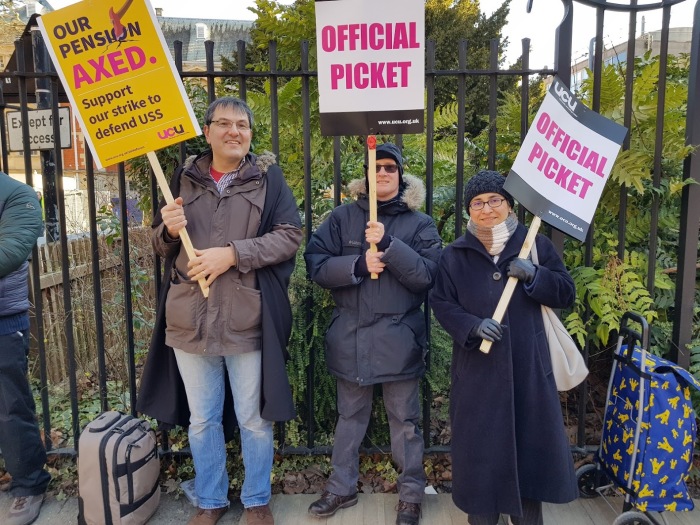For the last two weeks, British universities have been in the grip of a strike called by the University and College Union (UCU) in protest at planned reform of the universities pension scheme. Industrial action on this scale is a new thing for us and it is causing some confusion in Oxford, where despite widespread support, and growing anger, among lecturers, no one seem to be clear about how we should be striking. But we are learning fast. This is a view from the picket line.

Rally in support of the strike at Oxford, 22 February.
Some years ago, I was chatting with a student who had just returned from a study placement in France. She told how upon arriving at her host university, she had been unable to enter any buildings as there was a strike on. Her limited understanding of French prevented her from learning exactly what it was about. For the following two weeks no lectures took place. Students were unable to enter the library and spent their time sitting on the grass outside from where they could access the Wi-Fi. She did not feel the international experience had had a positive impact on her education.
The French enthusiasm for the right-to-strike was generally regarded by British lecturers as only slightly less baffling than the American enthusiasm for the right-to-bear-arms. Surely shutting down a university causes more trouble for staff and students than the senior management? In the time I have worked in UK higher education, there have only been a very few one-day strikes, which came and went without anyone in Oxford paying much attention.
I recount this story to make it clear that we don’t enjoy striking, and in the past it was not generally felt to be the right way to deal with disputes. But things are have now changed. We now have an issue that we feel is worth fighting for, and the lack of other options makes striking necessary.
The full story behind the USS pension reform and the reason for the current strike is complicated. I’m no economics or management expert, and as it has been explained in many articles and blogs, I won’t go into detail here. We are striking to defend the fair pension scheme we were promised, against a proposal to replace this with a system where our retirement income would depend on the stock market, with the typical lecturer set to lose £10,000 a year.
This has really pissed off a lot of people. For many university staff, a decent pension was an important reason to choose to work in the sector, despite lower salaries than outside. And this comes at a time when it seems we are being taken advantage of. We read news stories about large pay rises for vice chancellors, while any increase in ours is well below the rising cost of living. Recent legislation means strike action now requires not only a majority vote in favour, in a ballot of union members, but a turnout of at least 50% in such a ballot. Given the previous level of apathy about industrial action in my university I was a little surprised that the union got this, but just a little—as I said, people are angry. In Oxford 86% voted to strike, with a turnout of 52%.
But what does ‘going on strike’ actually mean? No one seems to have an entirely satisfactory answer to this. Obviously we don’t do any university teaching, but can we still come into the lab to check up on things? Or do we have to completely stop thinking about particle physics? There is a peculiarity which makes striking at Oxford especially odd: we are just striking against the university, not the colleges. Most of the teaching I do is college-based.
Academics are not very good at not working. We are always sending emails late at night and going into the lab at weekends. We’ve not done a strike like this before, so everyone is making up their own rules as we go along. It seems the default status is for professors to support the strike—then to continue working as usual as they don’t see why it should interfere with their research projects. This does have the potential to make the whole thing a bit of a farce. The idea of a strike is to be disruptive, but we find ourselves going out of the way to minimise the disruption.
Personally, as I wasn’t scheduled to do university teaching on strike days, I did wonder, if I just didn’t show up at work, would anyone even notice? This is what motivated me to get out and join the picket lines each morning. Making some sort of visible protest seems rather more important than not working. So, in freezing temperatures, which were a little colder each day, a small group of us gathered outside the physics department to wave our placards and hand out leaflets. There were more groups at locations across the city.

Picketing particle physicists.
In the old days (so I’m told) anyone crossing a picket line had their face kicked in. These days we just smile and politely ask them if they might like to support the strike. Or more often just bid them good morning. Most of them ignore us. I do have a lot of sympathy for young researchers on fixed term contracts who don’t feel they could strike. They are under enormous pressure to deliver results, and taking time off could well mean their contract is not renewed. One nice thing is the amount of support we have had from students. Groups have come along to the picket, bringing hot breakfast. We could understand if students were annoyed at the disruption to teaching, but instead they have come out to show solidarity. It seems they don’t like the commercialisation of higher education either.

Oxford students showing solidarity.
Every day there were a few more people on the picket. The strike has already achieved a lot of publicity and made many more people aware of the pension issue. As more people have been reading the details, and realising just how much we’ve been messed around, they come to support the strike. Our pension scheme is not in crisis, it’s actually been doing quite well. They’re using a flawed method to generate a projected deficit. While everyone welcomes the news that the union and Universities UK are negotiating, no one feels inclined to trust the employers. They thought they could push us over and were surprised when we fought back. We’re not going to back down now.









